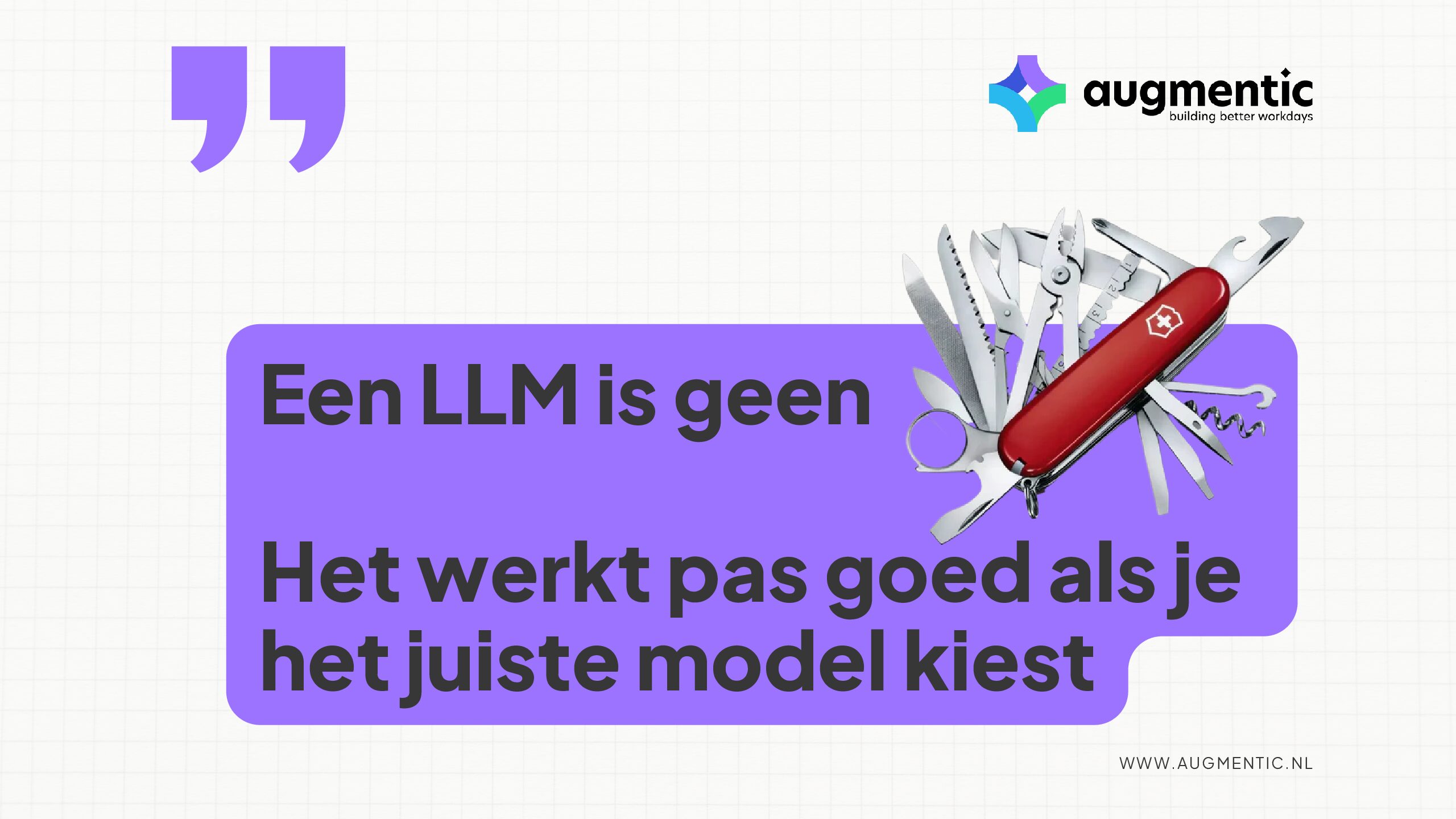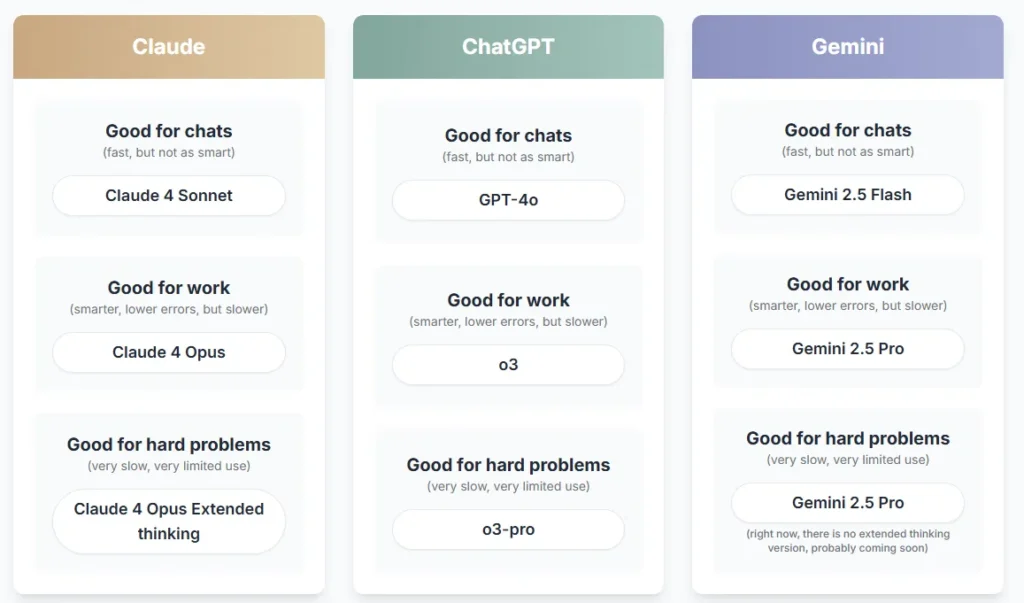Augmentic BV
Haaswijkweg east 12B
3319 GC Dordrecht
The Netherlands
Augmentic BV
Haaswijkweg east 12B
3319 GC Dordrecht
The Netherlands

AI is a tool, not an all-rounder. The real value comes from consciously choosing which AI model to use for which task. Each model has its own power - so choosing is not a luxury, but essential for effective use. Augmentic_OS supports that choice and helps make AI really work for you.

There have been countless opinions, trends and predictions about AI in recent months. But as is often the case with technological breakthroughs, the real difference only comes when you get to work with it yourself. Ethan Mollick, a professor at the Wharton School and one of the most accessible voices in the AI landscape, in his publication "Using AI Right Now: A Quick Guide" a surprisingly simple but effective piece of advice: Just go do it. But in the right way.
Mollick describes how many people still approach AI as if it were a search engine: short prompts, little context, no interaction. Whereas the very strength of this new generation of language models - so-called LLMs - lies in their ability to engage in real dialogue, reason, process documents, and adapt to your style or preferences. According to Mollick, you have to stop probing. It's time to think of AI as a colleague - and you won't understand it until you actually start working with it.
That starts with something often overlooked: you have choices. The question is no longer whether to use AI, but how. And with which model. Whether it's ChatGPT, Claude, Gemini or Mistral - each model has its own character, language qualities, speed and reliability. The paid versions offer access to the most powerful variants (think GPT-4o or Claude 3), and the difference from the free versions is huge. Like asking an intern to write your policy paper - or an experienced specialist.

But it goes beyond just free versus paid. Each model has its own strengths. GPT-4o is strong in logic, coding and accurate analysis. Claude excels at structuring long documents and making well-reasoned calls. Gemini scores on multilingualism and Web integration, while Mistral is lightweight and fast - ideal for shorter, repetitive tasks. By gaining experience with different models, you'll discover which one best suits your way of thinking, working and communicating.
That match is essential. An AI that rewrites text in your tone, understands questions as you mean them, or efficiently summarizes information in your area of expertise - that's the AI you want. And for that, you have to choose. Not just which model, but when to deploy which model. Thus, AI becomes not something you "use," but a tool you consciously deploy at the right time. After all, an LLM is not a jack-of-all-trades. It is a tool. And tools only work well if you know what they are intended for.
A striking point in Mollick's article is that it is not about the perfect prompt. You don't have to be an AI expert. It's about learning to work with AI. That means giving context, providing examples, asking through, giving feedback, and improving. Just like with a colleague, you gradually learn what works and what doesn't. The quality of the outcome grows with the conversation.
Mollick lists three applications that are already relevant to almost everyone:
What Mollick describes - working more consciously with AI and choosing the right model for the task - is also the starting point of our Augmentic_OS. The platform is designed around the idea that not every language model is appropriate for every task. Therefore, Augmentic_OS lets you decide which LLM to deploy per agent or application.
Whereas GPT-4o is suitable for complex analysis, Claude, on the other hand, is strong in long textual reflection. Gemini is ideal for multilingual applications, and Mistral excels at speed for repetitive tasks. Within Augmentic_OS, you can deploy those models where they do best - or even use several side by side, depending on the task.
That approach helps organizations view AI not as a generic powerhouse, but as a collection of specialized assistants. Each agent thus gets the tool that fits its function. No different than in a well-assembled team, where people use their strengths at the right time.
Why does that matter? Because AI only really becomes of value when you deploy it on your terms. An agent processing HR data has different requirements than an agent generating marketing copy. And a finance department may only want to use models that run locally in Europe. By building in that freedom, Augmentic_OS helps organizations make AI truly part of their work - without compromising on security or grip.
Moreover, at Augmentic, we envision a future where every employee is supported by their own AI agent. Not as a gimmick, but as structural help: for overview, structure, substantive tasks or administrative burden. Therefore, freedom of choice is not a luxury, but a precondition. Only then does AI connect with how people really want to work.
Mollick mentions another important thing: AI is not only a tool to speed up work, but also to mirror yourself. Ask AI not only for answers, but also to question your assumptions. Let it bring in other perspectives. Use it as a conversation partner in your thought process. Not because AI is always right - on the contrary - but because it challenges you to think better.
And yes, he says with a smile: being polite to AI sometimes helps. Not because the machine needs it, but because it forces you to formulate clearly, calmly and respectfully. And that improves collaboration - with AI as well as with humans.
Which underscores all this: AI is not a fixed product. It is a tool that only works when you know how you want to deploy it. By choosing which model to use. By determining how AI supports your work process. And by discovering step by step what works - and what doesn't.
Those who start experimenting today learn faster. Those who dare to collaborate with AI become more productive. And those who consciously choose, make work better. That's exactly what we at Augmentic are building every day with Augmentic_OS: an environment where people, processes and agents work together to create better workdays.
Ethan Mollick is a professor at the prestigious Wharton School at the University of Pennsylvania. With his Substack publication "One Useful Thing," he makes complex technology understandable and applicable. He tests AI tools daily, experiments with education, and shows what works - without hype, but with vision.
Source: https://www.oneusefulthing.org/p/using-ai-right-now-a-quick-guide